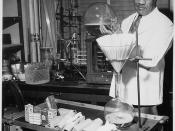Pharmacists dispense drugs prescribed by physicians and other health practitioners and provide information to patients about medications and their use. They advise physicians and other health practitioners on the selection, dosages, interactions, and side effects of medications. Pharmacists must understand the use, clinical effects, and composition of drugs, including their chemical, biological, and physical properties. Compounding--the actual mixing of ingredients to form powders, tablets, capsules, ointments, and solutions--is only a small part of a pharmacist's practice, because pharmaceutical companies in a standard dosage and drug delivery form produce most medicines. Most pharmacists work in a community setting, such as a retail drug store or in a hospital or clinic.
Pharmacists usually work in clean, well-lighted, and well-ventilated areas. When working with sterile or potentially dangerous pharmaceutical products, pharmacists wear gloves and masks and work with other special protective equipment. Many community and hospital pharmacies are open for extended hours or around the clock, so pharmacists may work evenings, nights, weekends, and holidays.
Consultant pharmacists may travel to nursing homes or other facilities to monitor patient's drug therapy. Pharmacists are experts in the science of medication therapy used to treat and prevent diseases and their symptoms. Pharmacists understand the effects of drugs on the body, the physical and chemical properties of drugs and dosage forms, the various ways to administer the medication, the interactions of medications with other drugs and foods, the potential and actual side effects of various therapies, and contraindications to particular drugs. Pharmacists advise physicians and other health care practitioners on the selection, dosage, interactions, and side effects of medications and make recommendations for particular therapies. In addition to dispensing medication, pharmacists also counsel patients and answer questions about prescription, over-the-counter medications, durable medical equipment, and supplies. Since pharmaceutical companies now manufacture many medications and solutions...


